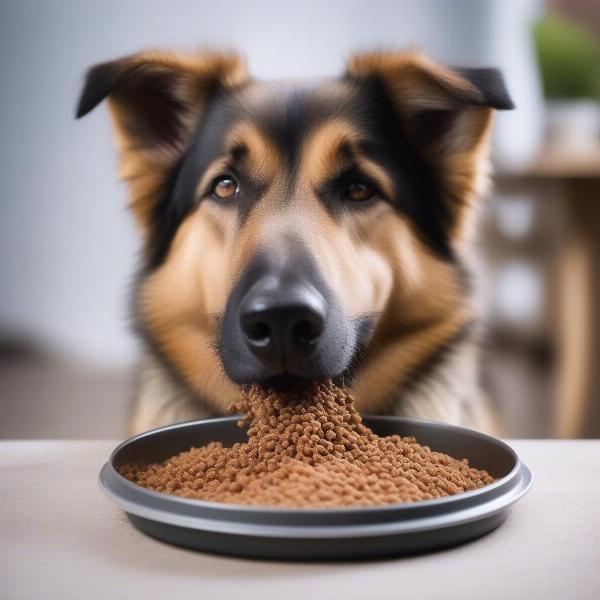Alsatian dog food, specifically designed for the unique needs of these large and majestic breeds, plays a vital role in their overall health and well-being. Whether you call them Alsatians, German Shepherds, or by their American Alsatian counterparts, understanding their dietary requirements is essential for responsible ownership. This comprehensive guide dives into the nuances of Alsatian dog food, addressing everything from puppyhood nutrition to senior care, and helping you make informed decisions to keep your furry companion thriving.
Understanding the Alsatian’s Dietary Needs
Alsatians are active and intelligent dogs, requiring a diet that supports their energetic lifestyle and sharp minds. Their large size also dictates specific nutritional considerations. A balanced diet rich in high-quality protein, healthy fats, and essential vitamins and minerals is crucial for maintaining muscle mass, joint health, and a strong immune system. Choosing the right Alsatian dog food can be overwhelming, but understanding their specific needs simplifies the process.
Protein Powerhouse: Fueling an Active Life
Protein is the building block of muscles and provides sustained energy for Alsatians. Look for dog foods with high-quality animal protein sources, such as chicken, beef, lamb, or fish, as the primary ingredients. Avoid fillers like corn and wheat, which offer less nutritional value.
Healthy Fats: Essential for Coat and Brain Function
Essential fatty acids, like omega-3 and omega-6, are vital for maintaining a healthy coat, skin, and brain function. These fats contribute to a glossy coat, reduce skin inflammation, and support cognitive development.
Vitamins and Minerals: Supporting Overall Health
A balanced blend of vitamins and minerals supports a strong immune system, healthy bones, and proper organ function. Look for dog foods that include essential vitamins like A, C, D, and E, as well as minerals like calcium, phosphorus, and zinc.
Choosing the Right Food for Different Life Stages
An Alsatian’s dietary needs change throughout its life. From puppyhood to senior years, selecting the appropriate food is paramount.
Puppy Power: Fueling Growth
Alsatian puppies require a diet rich in calories and nutrients to support rapid growth and development. Puppy formulas typically contain higher levels of protein and fat to meet these demands.
Adult Alsatians: Maintaining Peak Performance
Adult Alsatians need a balanced diet to maintain muscle mass, energy levels, and overall health. Choose a high-quality adult formula with appropriate protein and fat levels for their activity level.
Senior Support: Addressing Age-Related Needs
As Alsatians age, their metabolism slows down, and their nutritional needs change. Senior formulas often contain fewer calories and added joint support ingredients like glucosamine and chondroitin.
Common Dietary Concerns for Alsatians
Certain dietary concerns are more common in Alsatians than other breeds. Being aware of these issues can help you prevent potential problems.
Food Allergies and Sensitivities
Alsatians can be prone to food allergies and sensitivities. Common allergens include beef, chicken, dairy, and wheat. If your Alsatian experiences digestive upset or skin issues, consult with your veterinarian to determine if a food allergy is the culprit.
 Alsatian Eating Wet Food
Alsatian Eating Wet Food
Bloat: A Serious Health Risk
Bloat is a life-threatening condition that can affect large, deep-chested breeds like Alsatians. Feeding smaller, more frequent meals and avoiding strenuous exercise after eating can help reduce the risk of bloat.
Tips for Feeding Your Alsatian
- Measure portions: Avoid overfeeding, which can lead to obesity and other health issues.
- Freshwater: Always provide access to fresh, clean water.
- Gradual food changes: Introduce new foods gradually to avoid digestive upset.
- Monitor weight: Regularly check your Alsatian’s weight and adjust food portions accordingly.
Conclusion
Choosing the right Alsatian dog food is a crucial aspect of responsible pet ownership. By understanding their unique dietary needs and following the advice in this guide, you can provide your Alsatian with the nutrition they need to thrive throughout their life. A healthy diet contributes to a happy, energetic, and long-lived companion.
FAQ
- What is the best food for an Alsatian puppy? A high-quality puppy formula with high protein and fat content.
- How much should I feed my adult Alsatian? Follow the feeding guidelines on the dog food packaging and adjust based on your dog’s activity level and weight.
- What are the signs of a food allergy in an Alsatian? Common signs include itching, skin irritation, digestive upset, and ear infections.
- Can I feed my Alsatian raw food? Consult with your veterinarian before switching to a raw food diet.
- How can I prevent bloat in my Alsatian? Feed smaller, more frequent meals and avoid strenuous exercise after eating.
- What are some good sources of omega-3 fatty acids for Alsatians? Fish oil and flaxseed oil are excellent sources of omega-3s.
- Is it okay to give my Alsatian table scraps? Avoid table scraps as they can contribute to obesity and digestive problems.
Related articles:
- aggressive dog names male
- how much does wolf dog cost
- american alsatian dog for sale
- trained german shepherd protection dogs
About ILM Dog: ILM Dog provides expert advice on all aspects of dog care, from breed selection and training to nutrition and health. We offer comprehensive resources to help you provide the best possible care for your canine companion. Whether you’re looking for information on dog to work day or need guidance on choosing the perfect dog food, our experts are here to help. Contact us at [email protected] or +44 20-3965-8624 for personalized advice.